Tourism and Hospitality Products, Branding, and Pricing
- First Online: 09 May 2021

Cite this chapter

- Richard George 2
2976 Accesses
This chapter explores how marketers design and manage tourism and hospitality products. It begins with definitions for the terms “product”, “offering”, and “product mix”. It the chapter explains that the product is a complex concept that should be considered on three levels. These are the core, expected, and augmented product. Next, the product life cycle concept is discussed and how it is used by the tourism marketer to assess the development of tourism products. Next, the steps involved in the process of developing a new product are considered. In the second section of the chapter, the role of branding in the tourism and hospitality industry is discussed. The third section of the chapter considers the price component of the marketing mix. The factors that affect the pricing of tourism and hospitality products and the various pricing strategies available to the tourism and hospitality marketer are analysed. Next, several pricing approaches used in the tourism industry are considered. The chapter concludes by outlining the characteristics of tourism and hospitality products in relation to price. Last, the chapter’s in-depth case study demonstrates the principles of pricing as applied to medical tourism company MakeOvertour , based in Turkey.
This is a preview of subscription content, log in via an institution to check access.
Access this chapter
- Available as PDF
- Read on any device
- Instant download
- Own it forever
- Available as EPUB and PDF
- Compact, lightweight edition
- Dispatched in 3 to 5 business days
- Free shipping worldwide - see info
Tax calculation will be finalised at checkout
Purchases are for personal use only
Institutional subscriptions
Aaker, D. A. (1996). Building strong brands . New York: The Free Press.
Google Scholar
Baines, P., Fill, C., Rosengren, S., & Antonetti, P. (2019). Marketing (5th ed.). Oxford: Oxford University Press.
Baker, T. (2017). Dynamic pricing: an introduction . www.theaudienceagency.org/insight/dynamic-pricing-an-introduction . Accessed 20 November 2017.
Belobaba, P., Odoni, A. & Barnhart. C. (2009). The global airline industry . New Jersey: Wiley.
Ben-Natan, M., Ben-Sefer, E., & Ehrenfeld, M. (2009). Medical tourism: A new role for nursing? Journal of Issues in Nursing, 14 (3).
Boachie, P. (2016). Five strategies of psychological pricing . https://www.entrepreneur.com/article/279464 . Accessed 3 May 2018.
Bookman, M. Z., & Bookman, K. R. (2007). Medical tourism in developing countries . New York: Palgrave MacMillian.
Book Google Scholar
Cooper, R. (1986). Winning at new products . Reading, MA: Addison-Wesley.
Cooper, R. (2014). What’s next?: After stage-gate. Research-Technology Management, 57 (1), 20–31.
Article Google Scholar
Cowell, D. (1984). The marketing of services . London: Butterworth-Heinemann.
Day, G. (1981). The product life cycle: Analysis and applications issues. Journal of Marketing, 45 (Autumn), 60–67.
Dean, J. (1976). Pricing policies for new products. Harvard Business Review, 54 (6), 141–153.
Dibb, S., Simkin, L., Pride, W., & Ferrell, O. C. (1994). Marketing: Concepts and strategies (2nd ed.). London: Houghton-Mifflin.
Fyall, A., Legoherel, P., Frochot, I., & Wang, Y. (2019). Marketing for tourism and hospitality . London: Routledge.
Godin, S. (2003). Purple cow . London: Penguin.
Gregson, A. (2008). Pricing strategies for small business . Vancouver, BC: Self Counsel Press.
Guéguen, N., Jacob, C., Legohérel, P., & NGobo, P. (2008). Nine-ending prices and consumer behaviour in a restaurant. International Journal of Hospitality Management, 28 (1), 170–172.
Gunn, C. (1988). Vacationscape: Designing tourist regions (2nd ed.). Austin, TX: Bureau of Business Research University of Texas.
Hardy, J., Macrury, I., & Powell, H. (2018). The advertising handbook (4th ed.). New York: Routledge.
Hjalager, A. (2010). A review of innovation research in tourism. Tourism Management, 31 , 1–12.
Holloway, J. C. (2006). Marketing for tourism (4th ed.). Harlow, Essex: Prentice-Hall.
Horowitz, M., Rosensweig, J., & Jones, C. (2007). Medical tourism: Globalization of the healthcare marketplace. Medscape General Medicine, 9 (4), 33.
Hudson, S., & Hudson, L. (2017). Marketing for tourism, hospitality & events (2nd ed.). London: Sage.
Keller, K. (2009). Building strong brands in a modern marketing communications environment. Journal of Marketing Communications, 15 (2/3), 139–155.
Keller, K. L. (2003). Strategic brand management: building, measuring, and managing brand equity (2nd ed.). Upper Saddle River, NJ: Prentice-Hall.
Keller, K. L. (2012). Strategic brand management: Building, measuring, and managing brand equity (4th ed.). Upper Saddle River, NJ: Prentice-Hall.
Kilavuz, E. (2018). Medical tourism competition: The case of Turkey. International Journal of Health Management and Tourism, 3 (1), 42–58.
Kim, J. Y., Natter, M., & Spann, M. (2009). Pay what you want: A new participatory pricing mechanism. Journal of Marketing, 73 (1), 44–58.
Kotler, P., & Armstrong, G. (2019). Principles of marketing (17th ed.). London: Pearson Education.
Lasser, W., Mittal, B., & Sharma, A. (1995). Measuring customer-based brand equity. Journal of Consumer Marketing, 12 (4), 11–19.
Laws, E. (2011). Tourism marketing: Quality and service management perspectives (p. 124). London: Continuum International Publishing.
Laws, E. (2002). Tourism marketing: Quality and service management perspectives . London: Continuum.
Levitt, T. (1983). After the sale is over. Harvard Business Review, 61 (5), 87–93.
Lovelock, C. H. (1984). Developing and implementing new services. In W. R. George & C. E. Marshall (Eds.), Developing new services . Chicago, IL: American Marketing Association.
Lumsdon, L. (1997). Tourism marketing . London: International Thomson Press.
Lundberg, D., Krishnamoorthy, M., & Stavenga, M. (1995). Tourism economics . New York: Wiley.
Marn, M., Roegner, E. & Zawada, C. (2003, July). Pricing new products. The McKinsey Quarterly , 3: 40–49.
McCarthy, E. J. (1960). Basic marketing: A managerial approach . Homewood, IL: Irwin.
McCarthy, E. J., Cannon, J., & Perreault, W. (2015). Essentials of marketing (14th ed.). Homewood, IL: Irwin.
Moon, Y. (2005). Break free from the product life cycle. Harvard Business Review, 83 (5), 86–94.
Orr, G. (2014, 22 July). Honestybox hotels: You decide how much you pay’. Independent. http://www.independent.co.uk/travel/hotels/honesty-box-hotels-you-decide-how-much-you-pay-9622062.html . Accessed 24 Aug 2017.
Piazolo, M., & Zanca, N.A. (2011). Medical tourism: A case study for the USA and India, Germany, and Hungary, Acta Polytechnica Hungarica, 8 (1), 136–160.
Pike, S. (2018). Tourism marketing for small businesses . Oxford: Goodfellow Publishers.
Rosenthal, R. (2014). Optimarketing: Marketing to electrify your business . Seattle, WA: Amazon Create Space Publishing.
Russell, M. (2012, 21 April). Richard Branson fails: 14 Virgin companies that went bust. Business Insider . www.businessinsider.com/richard-branson-fails-virgin-companies-that-went-bust-2012-4 . Accessed 7 Dec 2016.
Saleh, S., Husain, F., Saud, M., & Isa, M. (2015). Strategic marketing and competitive analysis of Malaysian medical tourism industry. Proceeding-Kuala Lumpur International Business, Economics and Law Conference 6 , Vol.2. Kuala Lumpa.
Sowrey, T. (1990). Idea generation: Identifying the most useful techniques. European Journal of Marketing, 42 (5).
Stremersch, S., & Tellis, G. (2002). Strategic bundling of products and prices: A new synthesis for marketing. Journal of Marketing, 66 (1), 55–72.
Tanford, S., Baloglu, S., & Erdem, M. (2012). Travel packing on the internet: The impact of pricing information and perceived value on consumer choice. Journal of Travel Research, 51 (1), 68–80.
Tanner, J., & Raymond, M. (2012). Principles of marketing . Boston, MA: Flat World Knowledge.
Taylor, J. & Blackall, M. (2020, February 27). Bunking up: Airline unveils sleep pods for economy passengers. The Guardian , 3.
Tellis, G. (1986, October). Beyond the many faces of price: An integration of pricing strategies. Journal of Marketing, 50: 146–160.
Vernon, R. (1979). The product life cycle hypothesis in a new international environment. Oxford Bulletin of Economics and Statistics, 41 .
Walker, T. (2017, November). The price is…right? 20 The Guardian G2 : 10–11.
Withiam, G. (2001). A“4-C” strategy for yield management. Cornell Hospitality Report, 1 , 4–17.
Zeithaml, V.A. (1988, July). Consumer perceptions of price, quality, and value. Journal of Marketing, 5 2 :2–22.
Zwart, E. (2017). Commercial TV slogans . Retrieved from www.edwinno.com/edwinno-publications/my-writings/commercial-tv-slogans-1. Accessed 21 Aug 2018.
Further Reading
Burgess, C. (2014). Essential financial techniques for hospitality managers . Oxford: Goodfellow.
Slade-Brooking, C. (2017). Creating a brand identity: A guide for designers . London: Laurence King.
Trott, P. (2017). Innovation management and new product development (6th ed.). London: Pearson.
Download references
Author information
Authors and affiliations.
ICON College of Technology and Management/Falmouth University, London, UK
Richard George
You can also search for this author in PubMed Google Scholar
1 Electronic Supplementary Material
(pptx 535 kb), rights and permissions.
Reprints and permissions
Copyright information
© 2021 The Author(s), under exclusive license to Springer Nature Switzerland AG
About this chapter
George, R. (2021). Tourism and Hospitality Products, Branding, and Pricing. In: Marketing Tourism and Hospitality. Palgrave Macmillan, Cham. https://doi.org/10.1007/978-3-030-64111-5_8
Download citation
DOI : https://doi.org/10.1007/978-3-030-64111-5_8
Published : 09 May 2021
Publisher Name : Palgrave Macmillan, Cham
Print ISBN : 978-3-030-64110-8
Online ISBN : 978-3-030-64111-5
eBook Packages : Business and Management Business and Management (R0)
Share this chapter
Anyone you share the following link with will be able to read this content:
Sorry, a shareable link is not currently available for this article.
Provided by the Springer Nature SharedIt content-sharing initiative
- Publish with us
Policies and ethics
- Find a journal
- Track your research
UN Tourism | Bringing the world closer
Competitiveness.
- Market Intelligence
- Policy and Destination Management
Product Development
Share this content.
- Share this article on facebook
- Share this article on twitter
- Share this article on linkedin
As defined by UN Tourism, a Tourism Product is "a combination of tangible and intangible elements, such as natural, cultural and man-made resources, attractions, facilities, services and activities around a specific center of interest which represents the core of the destination marketing mix and creates an overall visitor experience including emotional aspects for the potential customers. A tourism product is priced and sold through distribution channels and it has a life-cycle".
Rural tourism
UN Tourism understands Rural Tourism as "a type of tourism activity in which the visitor’s experience is related to a wide range of products generally linked to nature-based activities, agriculture, rural lifestyle / culture, angling and sightseeing.
Gastronomy and Wine Tourism
As global tourism is on the rise and competition between destinations increases, unique local and regional intangible cultural heritage become increasingly the discerning factor for the attraction of tourists.
Mountain Tourism
Mountain Tourism is a type of "tourism activity which takes place in a defined and limited geographical space such as hills or mountains with distinctive characteristics and attributes that are inherent to a specific landscape, topography, climate, biodiversity (flora and fauna) and local community. It encompasses a broad range of outdoor leisure and sports activities".
Urban Tourism
According to UN Tourism, Urban Tourism is "a type of tourism activity which takes place in an urban space with its inherent attributes characterized by non-agricultural based economy such as administration, manufacturing, trade and services and by being nodal points of transport. Urban/city destinations offer a broad and heterogeneous range of cultural, architectural, technological, social and natural experiences and products for leisure and business".
Sports Tourism
Tourism and sports are interrelated and complementary. Sports – as a professional, amateur or leisure activity – involves a considerable amount of traveling to play and compete in different destinations and countries. Major sporting events, such as the Olympic Games, football and rugby championships have become powerful tourism attractions in themselves – making a very positive contribution to the tourism image of the host destination.
Shopping Tourism
Shopping Tourism is becoming an increasingly relevant component of the tourism value chain. Shopping has converted into a determinant factor affecting destination choice, an important component of the overall travel experience and, in some cases the prime travel motivation.

Weekender Management
In-Depth Guide to Understanding the Hospitality and Tourism Industry
Hospitality vs. Tourism, Industry Growth
When you hear about hospitality and tourism , think of them as two sides of the same coin. Hospitality focuses on the services that make people feel welcome and cared for, like staying in hotels or eating at restaurants. Tourism is all about the travel experiences and adventures people have away from home, including visiting attractions or going on tours.
The hospitality and tourism industry is a bustling world, filled with endless opportunities for adventure, relaxation, and exploration. It’s one of the fastest-growing industries globally, driving economies and creating millions of jobs. Whether it’s the charm of a local bed and breakfast, the splurge at a luxurious resort, the thrill of a theme park, or the convenience of a flight, this industry touches the lives of almost everyone.
For real estate investors eyeing the short-term rental market through platforms like Airbnb and VRBO, understanding the nuances between hospitality and tourism can unlock potential opportunities. It’s about creating memorable experiences that go beyond just a place to stay. The industry’s growth signals a promising avenue for returns on investment, emphasizing the importance of individualized service and tailored strategies for success.
This industry is about delivering comfort and experiences. With the right approach, property owners can not only contribute to this vibrant sector but also thrive within it.

Understanding Hospitality and Tourism
Definitions
At its core, hospitality is about providing a welcoming and caring environment for people who are away from home. This can range from a cozy bed-and-breakfast to a luxurious resort, from a quick service restaurant to a fine dining establishment. Hospitality is all about service, comfort, and making guests feel valued and cared for.
Tourism , on the other hand, is the act of traveling to and exploring places outside of your usual environment. It can be for leisure, like a vacation to see the world’s wonders, or for business, such as attending a conference in a different city. Tourism includes activities like sightseeing, experiencing local cultures, and attending events.
Differences
While hospitality and tourism are closely linked, they have distinct differences. Hospitality focuses on the services provided to guests, whereas tourism is concerned with the activities and experiences of those traveling. Think of tourism as the journey and exploration, while hospitality is about the stay and comfort during that journey.
Interconnection
Despite their differences, hospitality and tourism are deeply interconnected. Excellent hospitality services enhance the tourism experience, making destinations more attractive to visitors. For example, a memorable stay at a hotel or an exceptional dining experience can turn a good vacation into an unforgettable one. Conversely, a vibrant tourism sector boosts the hospitality industry by increasing the demand for lodging, food, and entertainment services.
Hospitality acts as the backbone of tourism; it’s what makes tourists feel welcome and ensures their needs are met during their travels. This synergy is crucial for the success and growth of both sectors.
The Importance of Both
Understanding the nuances between hospitality and tourism, and how they complement each other, is vital for anyone looking to build a career or business in these industries. The growth and dynamism of hospitality and tourism offer endless possibilities for innovation, career development, and contributing to the global economy. By recognizing the unique aspects of each sector while leveraging their interconnection, professionals can create more enriching experiences for travelers and guests alike, driving the industry forward.
In summary, hospitality and tourism are two sides of the same coin, each playing a critical role in the travel experience. While they have their distinct characteristics, their success relies on their ability to work together to provide unforgettable experiences for travelers around the world.
Moving forward, let’s delve into the Key Sectors in Hospitality and Tourism to further explore the diverse opportunities and challenges within these vibrant industries.
Key Sectors in Hospitality and Tourism
Hospitality and tourism encompass a wide range of services and experiences that cater to travelers and guests. This section highlights the core sectors: Lodging, Food and Beverage, Travel, Attractions, and Events . Understanding these sectors is crucial for anyone looking to build a career or invest in the hospitality and tourism industry.
Lodging refers to places where travelers can stay overnight, ranging from hotels and resorts to bed and breakfasts and vacation rentals. The lodging sector is foundational to hospitality, providing a ‘home away from home’ for travelers. Success in this sector hinges on excellent customer service, comfort, and creating memorable experiences. For instance, Emily Groves, a success story from MTSU’s Tourism and Hospitality Management (THM) program, showcased her versatility in event planning within the lodging sector, significantly contributing to guest satisfaction.
Food and Beverage
The Food and Beverage (F&B) sector is all about culinary experiences. It includes restaurants, cafes, bars, and any establishment offering food and drink services. This sector is characterized by its diversity, from fast food to luxury dining experiences. It’s not just about the food; it’s about the service, atmosphere, and overall dining experience. The F&B sector requires a keen understanding of culinary arts, customer preferences, and efficient operations.
This sector encompasses the means of getting to and from destinations. It includes airlines, cruise lines, car rentals, and public transportation. The travel sector is integral to tourism, connecting different parts of the world and making destinations accessible. Companies in this sector often work closely with lodging and attractions to create packages and itineraries for travelers. For example, collaborations between local businesses and travel influencers can significantly enhance visibility and appeal.
Attractions
Attractions are the landmarks, natural wonders, theme parks, museums, and cultural sites that draw tourists to a destination. This sector is vital for its ability to enrich the travel experience through entertainment, education, and leisure activities. Attractions often serve as the primary reason for choosing a destination, highlighting the importance of preserving and promoting these sites.
The Events sector includes conferences, trade shows, weddings, festivals, and any organized gatherings. This sector is dynamic, requiring meticulous planning, coordination, and marketing to ensure successful and memorable events. It offers diverse opportunities, from event planning to logistics and vendor management. Engaging in coursework and connecting with professors, as advised by Emily Groves, can provide invaluable insights and skills for success in this sector.
Each of these sectors offers unique challenges and opportunities. Whether it’s providing luxury lodging, crafting exquisite dining experiences, facilitating travel, managing attractions, or organizing events, professionals in hospitality and tourism need a blend of skills, including communication, customer service, and adaptability. The industry is evolving, with sustainability and technology becoming increasingly important. Aspiring professionals should stay informed about industry trends, seek relevant education and training, and embrace diverse opportunities to succeed in this vibrant field.
Moving forward, we’ll explore the Career Opportunities in Hospitality and Tourism , highlighting the various paths one can take within this exciting industry.
Career Opportunities in Hospitality and Tourism
The hospitality and tourism industry is a world of opportunities for those passionate about creating memorable experiences for others. Whether you’re drawn to the kitchen’s heat or the thrill of organizing large events, there’s a place for you. Let’s dive into the different career paths available.
Hospitality and Tourism Management
In the realm of hospitality and tourism management , professionals keep hotels, resorts, and tourism offices running smoothly. This could mean ensuring guests have the best stay possible at a hotel or making sure a tourist office effectively promotes local attractions.
Managers in this sector need a mix of management, marketing, and operations skills . They might find themselves analyzing financial reports one day and brainstorming marketing strategies the next. It’s a role for those who love variety and challenges.

Culinary Arts and Hospitality
For those who find joy in food and drink, the culinary arts and hospitality sector offers a bounty of career paths. Chefs and restaurant managers are the stars here, crafting delicious dishes and ensuring restaurants run without a hitch.
It’s not just about cooking; it’s about creating experiences. Chefs today are innovators and artists, constantly exploring new culinary landscapes. Restaurant managers, on the other hand, make sure that the service matches the quality of the food, leading teams to provide exceptional customer experiences.

Event Planning and Management
Event planning and management is a field for those who love to see a plan come together. From weddings to conferences and trade shows , event planners are the architects of experiences, crafting memorable moments for attendees.
This role demands creativity, meticulous organization, and the ability to manage stress. Event planners juggle various tasks, from choosing the perfect venue to coordinating vendors and managing budgets. It’s a career for those who get a thrill from bringing people together and making events happen.

Each of these career paths in hospitality and tourism offers a unique set of challenges and rewards. Whether you’re managing a hotel, running a kitchen, or planning the next big conference, your work contributes to the rich tapestry of experiences that define the hospitality and tourism industry.
Success in these fields requires a blend of hard skills and soft skills, from technical knowledge to excellent communication and customer service. And with the industry’s growth, the opportunities for advancement are vast. So, if you’re passionate about hospitality and tourism, there’s no better time to start your journey.
Moving on, we’ll delve into the Essential Skills for a Successful Career in Hospitality and Tourism , highlighting what it takes to thrive in this dynamic industry.
Essential Skills for a Successful Career in Hospitality and Tourism
The role of education and training.
To succeed in hospitality and tourism, you need more than just a love for travel and people. This industry demands a set of key skills and the right education to back them up. Let’s break it down:
Communication : Clear and effective communication is the cornerstone of hospitality and tourism. Whether you’re explaining the details of a local attraction or resolving a guest’s issue, how you communicate can make or break their experience.
Customer Service : This is all about making guests feel valued and taken care of. It’s not just about being friendly; it’s about going the extra mile to ensure their stay or experience is memorable for all the right reasons.
Flexibility : The only constant in hospitality and tourism is change. You might need to handle a last-minute booking, deal with unexpected travel disruptions, or adapt to new health and safety protocols. Being flexible and adaptable is key.
Cultural Awareness : With guests coming from all corners of the globe, understanding and respecting cultural differences is crucial. This awareness can enhance guest experiences and prevent misunderstandings.
Education and Training
Now, how do you develop these skills? Education and training play a crucial role.
Bachelor’s Degrees : A bachelor’s degree in hospitality management or tourism provides a solid foundation. These programs cover everything from the basics of customer service to the complexities of global tourism management.
Master’s Degrees : For those looking to take their career to the next level, a master’s degree offers specialized knowledge and leadership training. It’s perfect for roles in management and strategic planning within the industry.
Certifications : Short-term certifications can also boost your career. These might focus on specific areas like revenue management, event planning, or even sommelier courses for the food and beverage sector.
Institutions like Glion offer comprehensive programs that not only cover these essential skills but also provide practical experience through internships and industry projects. This hands-on experience is invaluable, allowing you to apply what you’ve learned in real-world settings.
The hospitality and tourism industry is about creating experiences. Whether you’re managing a hotel, planning events, or guiding tours, your success hinges on your ability to connect with and understand people from all walks of life. Education and training equip you with the tools to do just that, setting you up for a rewarding career in this vibrant industry.
As we look ahead, let’s explore the Growth and Future of the Hospitality and Tourism Industry and what it means for professionals in this field.
Growth and Future of the Hospitality and Tourism Industry
The hospitality and tourism industry is on a fast track, evolving with new trends, technology, and a strong focus on sustainability. Let’s dive into what’s shaping the future of this vibrant sector.
Industry Trends
Personalized Experiences : Travelers today seek unique and personalized experiences. They want to dive deep into local cultures, cuisines, and activities that are not part of the usual tourist trails. This demand is pushing businesses to customize their offerings.
Health and Wellness Tourism : A growing trend, especially post-pandemic, is the focus on health and wellness. Destinations offering wellness retreats, spa experiences, and outdoor activities are becoming increasingly popular.
Bleisure Travel : The blend of business and leisure travel is a trend that’s here to stay. Professionals often extend their business trips to enjoy the destination, leading to opportunities for hospitality and tourism sectors to cater to this niche.
Technological Advancements
AI and Machine Learning : From chatbots answering customer queries to AI-driven personalization of travel experiences, technology is at the forefront of transforming how services are delivered and experienced.
Virtual Reality (VR) and Augmented Reality (AR) : These technologies offer potential guests a sneak peek into what they can expect from their travel experience, enhancing their decision-making process.
Smart Rooms : The use of smart technology in hotel rooms for controlling temperature, lighting, and even ordering room service is enhancing guest experiences by offering convenience at their fingertips.
Sustainability
Eco-friendly Practices : There’s a significant shift towards sustainable tourism. Travelers are more conscious of their environmental impact, leading to a demand for eco-friendly accommodations and travel options.
Local Community Engagement : Supporting local communities by promoting local artisans, guides, and culinary experiences is becoming a priority for travelers, aligning with sustainable tourism goals.
Sustainable Transportation : The promotion of electric vehicles, bicycles, and walking tours is not only reducing the carbon footprint but also offering unique and immersive ways to explore destinations.
Looking Ahead
The future of hospitality and tourism is bright and brimming with opportunities. As the industry adapts to changing consumer preferences, embraces technology, and moves towards sustainability, it opens up new avenues for growth and innovation.
Professionals in this field must stay abreast of these trends, continuously update their skills, and remain flexible to navigate the evolving landscape of hospitality and tourism. With a forward-looking approach, the industry is set to offer unparalleled experiences to travelers, making it an exciting time to be part of this dynamic field.
As we continue to explore the vast opportunities within hospitality and tourism, it’s clear that the sector is not just about travel and accommodation anymore. It’s about creating memorable experiences, leveraging technology for convenience and personalization, and most importantly, doing so in a way that respects and preserves our planet for future generations .
In conclusion, the growth and future of the hospitality and tourism industry are shaped by the collective efforts of businesses, professionals, and travelers themselves, working towards a more sustainable, tech-savvy, and personalized travel experience.
Frequently Asked Questions about Hospitality and Tourism
In hospitality and tourism , there’s a lot to explore. Let’s dive into some common questions to help clear things up.
What is tourism and hospitality?
At its core, tourism is about traveling. Whether it’s for fun, to see family, or for work, it’s all about going to different places. Hospitality is how we make those travelers feel welcome. Think hotels, restaurants, and all the services that make a trip enjoyable.
These two go hand in hand. Without tourism, there’s less need for hospitality. And without good hospitality, tourism wouldn’t be as appealing.
Is hospitality and tourism a good degree?
Yes, it is. Here’s why:
- Job opportunities : This field is growing fast. From managing a hotel to planning events, there are many paths you can take.
- Diverse skills : You learn about business, customer service, and working with different cultures.
- Travel : For those who love to see new places, some jobs in this field might even require you to travel as part of your work.
What does hospitality and tourism fall under?
Hospitality and tourism is a part of the service industry. It includes a wide range of businesses, like hotels, restaurants, travel agencies, and theme parks. These businesses all share a common goal: to take care of people when they’re away from home, whether they’re on vacation or traveling for work .
In conclusion, the hospitality and tourism industry is vibrant and full of opportunities for those who are passionate about making people’s travel experiences memorable and enjoyable. Whether you’re interested in the operational side, like managing a hotel, or the creative aspect, like planning tours or events, there’s a place for you in this dynamic field.
Wrapping up our exploration of the hospitality and tourism sector, it’s clear that this industry is not just about providing services; it’s about creating experiences that last a lifetime. For those with a passion for making every guest’s stay memorable, the opportunities for career advancement are both vast and fulfilling.
Career Advancement in hospitality and tourism often means moving up the ranks from operational roles into management and beyond. It’s about honing your skills in communication, customer service, and flexibility, while also embracing the cultural awareness needed to cater to a global clientele. The path to advancement might start on the front lines but can lead to roles as a hotel manager, event coordinator, or even a travel consultant, each offering the chance to make a significant impact on the experiences of travelers and guests.
At Weekender Management , we understand the nuances and complexities of the hospitality and tourism industry. Our commitment is not just to our clients but to the broader community of professionals seeking to make their mark in this vibrant field. Through our comprehensive management services, we strive to maximize the potential of vacation rental properties, ensuring they not only meet but exceed the expectations of guests. Our focus on continuous improvement and long-term growth positions us as a strategic partner for those looking to advance their careers within this exciting industry.
Whether you’re a property owner looking to elevate your rental’s performance or a hospitality professional aiming for the next step in your career, Weekender Management is here to support your journey. With our deep industry knowledge and dedication to excellence, we help our clients navigate the complexities of the vacation rental market, ensuring their success now and in the future.
For those passionate about the hospitality and tourism industry, the possibilities are endless. With the right approach, dedication, and a partner like Weekender Management, achieving your career goals and contributing to the vibrant tapestry of this industry is well within reach.
Discover how we can help you maximize your potential in the hospitality and tourism industry by visiting Weekender Management . Together, let’s create unforgettable experiences for guests around the world and pave the way for your successful career in this dynamic field.
Leave a Reply Cancel reply
Your email address will not be published. Required fields are marked *
Save my name, email, and website in this browser for the next time I comment.
- Hospitality Industry
Hospitality Trends: A glimpse into the future of the industry

August 16, 2023 •
10 min reading
Step into the future of hospitality as we uncover the captivating realm of short- and long-term perspectives that are reshaping the industry. Let’s explore how technology is helping hospitality firms create an unparalleled guest experience and learn about the futuristic ideas that spark the imagination and are setting the stage for our extraordinary tomorrow.
---- HOSPITALITY INSIGHTS ----
This month, we have decided to share with you some industry trends. In the short-term perspective section, we have selected the ones you can expect to see in the next 2-3 years, while in the long-term chapter we highlight trends that will take longer to be implemented.
Short-term perspective
Development of a more inclusive and responsible travel mindset.
In recent years, the concept of responsible travel has gained significant attention and importance in the world of tourism. More and more travelers are committed to making their trips more environmentally and socially responsible. In a similar vein, inclusive travel is becoming essential for customers. In the U.K., two-thirds of customers think an equity, diversity, and inclusion (EDI) policy is important for companies in the hospitality and tourism industry. For UKHospitality Chief Executive Kate Nicholls, this is not surprising as: “Hospitality has always been a people-first business and has a tradition of being one of the most inclusive sectors in the world.” Both these trends are having a significant impact on the hospitality industry.
How new technologies could facilitate the customer experience
For a long time, flying cars have been seen as a pipe dream at best or a whimsical folly at worst. Remember the Jetsons? Yet, it seems like it may become a reality in the not-too-distant future. Soon, we may be able to hail a flying cab in some cities to go to the train station or to visit a museum! When it comes to facilitating tourists’ journey, Biometric identification , such as fingerprint, facial recognition, and iris scans, is gaining in popularity at airports worldwide, including in Europe. This technology offers faster and more accurate passenger screening, reducing processing time for procedures like baggage check-in. Airports like Dubai International, Hong Kong International, Tokyo Narita, and London Heathrow already utilize facial recognition technology, while the European Union plans to implement an automated entry-exit system using fingerprints and facial images by 2024. Airlines like Emirates and major U.S. carriers have also been incorporating biometric identification for streamlined travel experiences.

The greening of the industry: Embracing sustainable practices
Vegan food is becoming more and more trendy. While, for some, this trend could threaten the savoir-faire of gourmet cooking (e.g., the art of preparing meat), more and more chefs are starting to develop innovative ways to cook vegetables. In the process, they are developing new complex techniques and new know-how. As summarized by Ixta Belfrage , a U.K.-based cookbook author “Plant forward is the way forward” and she recommends making “plants the star of the dish to eat less animal products”. The democratization of vegan food underlines the sustainability turn undertaken by the hospitality and tourism industry. One fine example of this is also the Global sustainability challenge , which invites students from Hospitality Business Schools all around the world to find innovative and sustainable solutions. This year, the focus was on being “one with nature” and encouraging students to imagine regenerative hospitality concepts.
Long-term horizon
The rise of futuristic-like transportation and traveling means.
Hyperloop trains are seen as sustainable solution for inter-city travel. Even though the technology is not there yet, it is increasingly likely that they will become part of our transportation systems in the long run. Indeed, companies such as Virgin Hyperloop or Elon Musk’s own The Boring Company are working on developing and testing hyperloop technology. Space tourism is becoming a reality for affluent explorers, with various companies offering expeditions beyond Earth's boundaries, such as Blue Origin's trips to outer space and SpaceX's plans for civilian missions around the moon. Yet one should not expect space travel to become the norm anytime soon but, eventually, it is expected to become more accessible and popular on a small scale. One can question the sustainable impact this new kind of travel will have though...

Net-zero target: the ultimate goal for the hospitality industry
Regarding sustainability, one shipbuilder has amassed a dizzying array of technology as it aims to launch its first zero greenhouse gas emissions boat by 2030. The future of travel is inevitably linked to climate change. As a result, actors in the hospitality industry, such as the International Civil Aviation Organization (ICAO), have committed to being net zero by 2050. Indeed, a mix of technologies , ranging from sustainable aviation fuel to hydrogen-powered engines to all-electric planes in the next decade, should help the industry to reach its carbon neutral goal. However, some have expressed considerable doubts regarding the ability of the airline industry to reach this ambitious target.
---- HOSPITALITY INNOVATION ----
Recent stories in the news have pointed to the sustained emergence of several innovations that are likely to stay with us well beyond tomorrow. From seamless technology to futuristic experiences with ubiquitous sustainability, these pervasive innovations are changing the landscape of the hospitality industry, setting new standards forguest services.
Seamless and smooth technologies to easy daily tasks
While we all expect tools like ChatGPT to impact the promotion of tourism, the future of innovation goes beyond AI alone. The future internet will revolutionize travel by offering virtual reality experiences, enhancing real-world travel, and incorporating Web3 technologies. Blockchain and smart contracts can be utilized for booking platforms, eliminating intermediaries, while NFTs can be used to create digital passports as tokens on the decentralized web.
The use of digital wallets and contactless payment systems for mobile ticketing in public transport and tourist attractions means you won’t have to fumble for change when boarding a bus in New Delhi or Sydney or Sao Paolo. In addition, the abundance of data generated through these innovative solutions can also enrich the tourism sector. By analyzing spending patterns and preferences, businesses can tailor their offerings and create personalized marketing and promotion strategies that cater to individual needs and interests.
There have been notable changes in the ways we traditionally handle certain aspects of travel. For instance, managing and safeguarding our luggage used to be our responsibility. However, to address this issue, Accor , a global hospitality leader, is partnering with startup Alltheway to provide a seamless and stress-free travel experience by offering baggage transportation between city centers and airports. This collaboration is set to expand internationally by late 2024.
An all-in-one hospitality solution has garnered attention from such giants as Apple who recently filed a patent for “systems and methods for accessing hotel services using a portable electronic device”. This suggests that Apple could be planning to develop a hotel application that consolidates all guest interactions, including booking a room, check-in, ordering services, and more, into one place.
In general, all guest interactions are important, and the main innovations are expected in six key moments : booking, check-in, service, food and beverage, check-out, and post-experience. For instance, consumers expect the entire booking process to be user-friendly and streamlined, providing them with all the information they need in a single view. Companies must also adopt a mobile-first approach, as an increasing number of travelers now prefer to book reservations on their smartphones or mobile devices. If the content provided is insufficient, or disorganized or the responses are slow, consumers get frustrated fast and will seek alternatives elsewhere.
Another intriguing signal in hospitality points to the future being centered around user disengagement . This approach prioritizes the integration of unobtrusive background technology that enhances human-to-human interaction. In simpler terms, the technology should operate silently, freeing people from screens and other processes that do not add value to their experience. By making the technology invisible yet reliable, hotel staff can spend less time looking at screens when a guest stands right in front of them, allowing them to focus more on personal interactions. Nobody goes to a hotel to suffer through these administrative moments or “engage” with a phone to order something. We need to embrace technology that seamlessly works in the background, enabling maximum human engagement when needed. The rise of interest in devices that bring us back to real life further confirms this signal. For instance, the “Nothing phone” , which leverages the Glyph interface to help users focus more on the world around them rather than their phones, recently announced its second edition, underscoring the growing demand for technology that promotes well-being, mindfulness, and real-life experiences.
Futuristic cues in the hospitality industry
The most futuristic innovations appear to be emerging in the food industry. According to the report dedicated to the 10th anniversary of Deliveroo , we can anticipate a much more personal touch in our diets. For instance, the integration of BreathTech can allow us to breathe into a device and receive personal recommendations on the optimal food to consume for our health. AI will aid in creating diets that are fully aligned with our individual nutrition needs. Furthermore, 3D printing technologies will create printed lunches for us, making food preparation much more convenient. Additionally, through the use of VR/AR and smart glasses, we can trick our brains and senses into thinking that we’re eating chocolate when, in fact, it may be broccoli. These innovations are reshaping our very perception of what food is and isn’t. While dining remains one of the tangible things we want to experience and share with others, the surge in take-away concepts in recent decades may pave the way for 3D food printers , which could become omnipresent by 2073.

Furthermore, there is a growing expectation for more sustainable solutions in the food sector, as traditionally unhealthy ingredients can now be substituted with novel products. For instance, one startup foresees exponential growth in the personalized nutrition segment and is actively developing plant-based products and other ingredient innovations for diverse applications. These advancements aim to create healthier meals and contribute to a more sustainable ecosystem. We also anticipate a transition in the entire value creation process, shifting towards sustainability and upholding the principles of a circular economy.
At the city level, positive dynamics are expected as well. Dubai, renowned as the “City of the Future” , is committed to being even more futuristic and further advancing its tourism industry by embracing greater levels of inclusivity, sustainability, and technological development. As an example of their dedication, all hotels in Dubai are mandated to adhere to the country’s sustainability standards.
Forward-thinking players in the hospitality industry are eager to embrace the Metaverse and experiment with blending the real and virtual worlds to create unforgettable personalized experiences. This includes innovative concepts such as a futuristic virtual check-in, virtual art installations in hotel lobbies, or hosting virtual concerts, all aimed at pushing the boundaries of traditional hospitality.
Decentraland, a virtual world powered by blockchain technology, is emerging as a vibrant hub for hotels and restaurants looking to explore new frontiers. One example of this is LEVENverse, which envisions a fun and immersive virtual hotel environment by LEVEN, challenging the conventional hotel archetype and offering a captivating experience for guests. These pioneering efforts are just a glimpse of the possibilities that come with the convergence of technologies and imagination. For instance, in a groundbreaking move, Indonesia became the first country to use Web3 and NFTs to protect its cultural heritage and revitalize its tourism industry. By embracing current and new technologies, we are ready to explore the transformative potential of immersive and interactive digital experiences.
---- HOSPITALITY INSPIRATION----
Read, watch and listen.
- Learn more about the proteins of the future with "Fungi bacon and insect burgers: a guide to the Proteins of the future"
- Read how travel can become more inclusive with "The Future of queer travel"
- Looking to create new menus for your restaurants? Gain some innovative insights with the Future menu trends report 2023
- Have a look at Masdar City and its innovative transportation system
- Widen your knowledge about The future of food and nutrition by listening to Professor Johannes le Coutre
- Discover insights from renowned hotelier Liz Lambert about creating unique guest experiences in the travel landscape and what the future holds for us in hospitality

Research Assistant & Visiting Lecturer at EHL Hospitality Business School

Research Associate at EHL Hospitality Business School
Keep reading

Luxury hotels and a ‘sense of place’: Brand identity and experiences
Apr 24, 2024

Luxury hotels and a ‘sense of place’: The branding imperative
Apr 17, 2024

Navigating challenges of AI and maximizing value in the service sector
Apr 16, 2024
This is a title
This is a text
- Bachelor Degree in Hospitality
- Pre-University Courses
- Master’s Degrees & MBA Programs
- Executive Education
- Online Courses
- Swiss Professional Diplomas
- Culinary Certificates & Courses
- Fees & Scholarships
- Bachelor in Hospitality Admissions
- EHL Campus Lausanne
- EHL Campus (Singapore)
- EHL Campus Passugg
- Host an Event at EHL
- Contact our program advisors
- Join our Open Days
- Meet EHL Representatives Worldwide
- Chat with our students
- Why Study Hospitality?
- Careers in Hospitality
- Awards & Rankings
- EHL Network of Excellence
- Career Development Resources
- EHL Hospitality Business School
- Route de Berne 301 1000 Lausanne 25 Switzerland
- Accreditations & Memberships
- Privacy Policy
- Legal Terms
© 2024 EHL Holding SA, Switzerland. All rights reserved.

Want to create or adapt books like this? Learn more about how Pressbooks supports open publishing practices.
Chapter 1. History and Overview
1.1 What is Tourism?
Before engaging in a study of tourism , let’s have a closer look at what this term means.
Definition of Tourism
There are a number of ways tourism can be defined, and for this reason, the United Nations World Tourism Organization (UNWTO) embarked on a project from 2005 to 2007 to create a common glossary of terms for tourism. It defines tourism as follows:
Tourism is a social, cultural and economic phenomenon which entails the movement of people to countries or places outside their usual environment for personal or business/professional purposes. These people are called visitors (which may be either tourists or excursionists; residents or non-residents) and tourism has to do with their activities, some of which imply tourism expenditure (United Nations World Tourism Organization, 2008).
Using this definition, we can see that tourism is not just the movement of people for a number of purposes (whether business or pleasure), but the overall agglomeration of activities, services, and involved sectors that make up the unique tourist experience.
Tourism, Travel, and Hospitality: What are the Differences?
It is common to confuse the terms tourism , travel , and hospitality or to define them as the same thing. While tourism is the all-encompassing umbrella term for the activities and industry that create the tourist experience, the UNWTO (2020) defines travel as the activity of moving between different locations often for any purpose but more so for leisure and recreation (Hall & Page, 2006). On the other hand, hospitality can be defined as “the business of helping people to feel welcome and relaxed and to enjoy themselves” (Discover Hospitality, 2015, p. 3). Simply put, the hospitality industry is the combination of the accommodation and food and beverage groupings, collectively making up the largest segment of the industry (Go2HR, 2020). You’ll learn more about accommodations and F & B in Chapter 3 and Chapter 4 , respectively.
Definition of Tourist and Excursionist
Building on the definition of tourism, a commonly accepted description of a tourist is “someone who travels at least 80 km from his or her home for at least 24 hours, for business or leisure or other reasons” (LinkBC, 2008, p.8). The United Nations World Tourism Organization (1995) helps us break down this definition further by stating tourists can be:
- Domestic (residents of a given country travelling only within that country)
- Inbound (non-residents travelling in a given country)
- Outbound (residents of one country travelling in another country)
Excursionists on the other hand are considered same-day visitors (UNWTO, 2020). Sometimes referred to as “day trippers.” Understandably, not every visitor stays in a destination overnight. It is common for travellers to spend a few hours or less to do sightseeing, visit attractions, dine at a local restaurant, then leave at the end of the day.
The scope of tourism, therefore, is broad and encompasses a number of activities and sectors.
Spotlight On: United Nations World Tourism Organization (UNWTO)
UNWTO is the United Nations agency responsible “for the promotion of responsible, sustainable and universally accessible tourism” (UNWTO, 2014b). Its membership includes 159 countries and over 500 affiliates such as private companies, research and educational institutions, and non-governmental organizations. It promotes tourism as a way of developing communities while encouraging ethical behaviour to mitigate negative impacts. For more information, visit the UNWTO website .
NAICS: The North American Industry Classification System
Given the sheer size of the tourism industry, it can be helpful to break it down into broad industry groups using a common classification system. The North American Industry Classification System (NAICS) was jointly created by the Canadian, US, and Mexican governments to ensure common analysis across all three countries (British Columbia Ministry of Jobs, Tourism and Skills Training, 2013a). The tourism-related groupings created using NAICS are (in alphabetical order):
- Accommodation
- Food and beverage services (commonly known as “F & B”)
- Recreation and entertainment
- Transportation
- Travel services
These industry groups (also commonly known as sectors) are based on the similarity of the “labour processes and inputs” used for each (Government of Canada, 2013). For instance, the types of employees and resources required to run an accommodation business whether it be a hotel, motel, or even a campground are quite similar. All these businesses need staff to check in guests, provide housekeeping, employ maintenance workers, and provide a place for people to sleep. As such, they can be grouped together under the heading of accommodation. The same is true of the other four groupings, and the rest of this text explores these industry groups, and other aspects of tourism, in more detail.
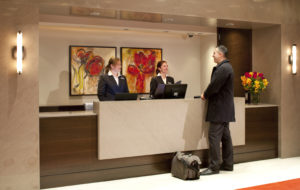
It is typical for the entire tourist experience to involve more than one sector. The combination of sectors that supply and distribute the needed tourism products, services, and activities within the tourism system is called the Tourism Supply Chain. Often, these chains of sectors and activities are dependent upon each other’s delivery of products and services. Let’s look at a simple example below that describes the involved and sometimes overlapping sectoral chains in the tourism experience:
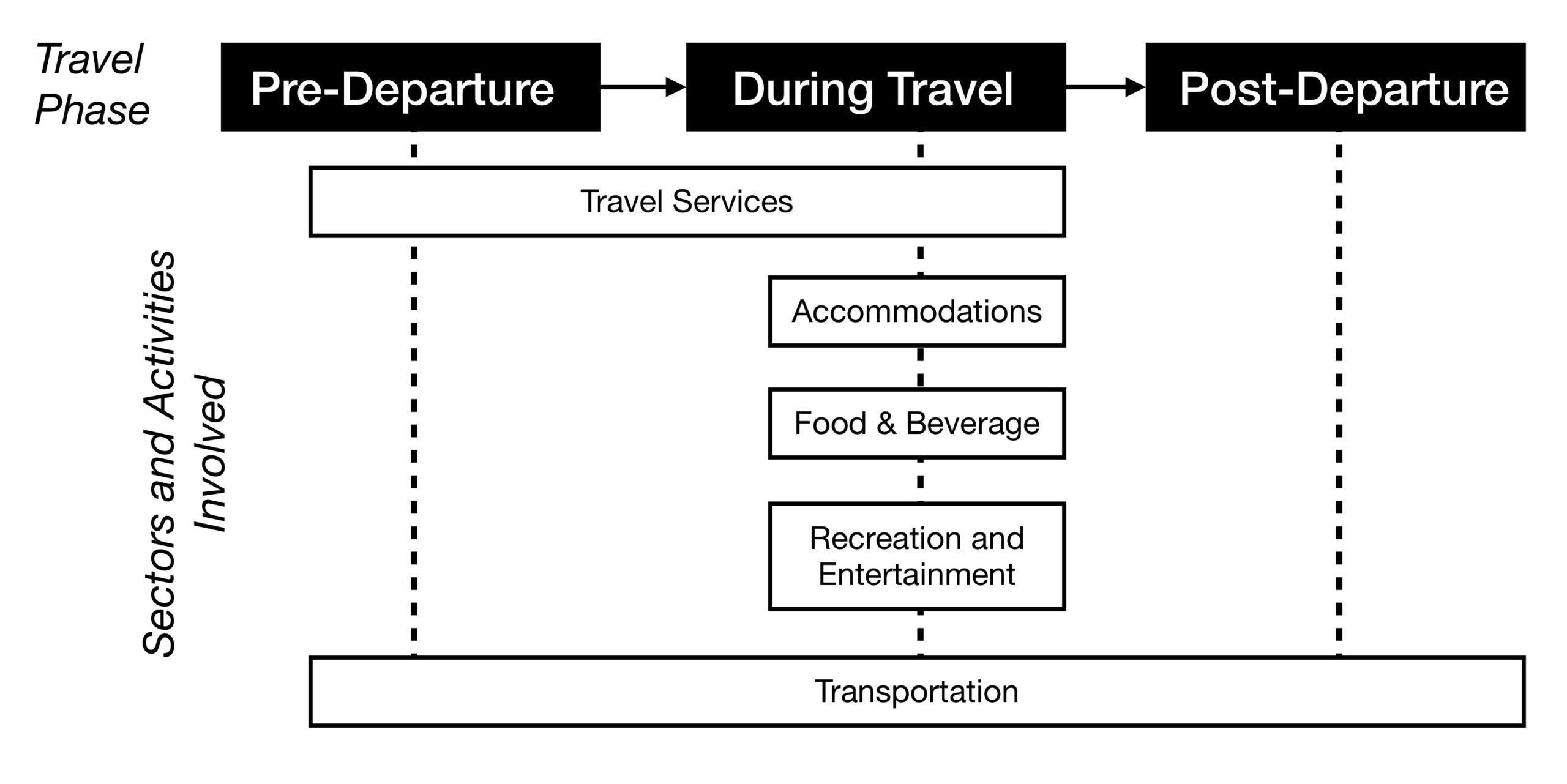
Before we seek to understand the five tourism sectors in more detail, it’s important to have an overview of the history and impacts of tourism to date.

Long Descriptions
Figure 1.2 long description: Diagram showing the tourism supply chain. This includes the phases of travel and the sectors and activities involved during each phase.
There are three travel phases: pre-departure, during travel, and post-departure.
Pre-departure, tourists use the travel services and transportation sectors.
During travel, tourists use the travel services, accommodations, food and beverage, recreation and entertainment, and transportation sectors.
Post-departure, tourists use the transportation sector.
[Return to Figure 1.2]
Media Attributions
- Front Desk by Staying LEVEL is licensed under a CC BY-NC 4.0 Licence .
Tourism according the the UNWTO is a social, cultural and economic phenomenon which entails the movement of people to countries or places outside their usual environment for personal or business/professional purposes.
UN agency responsible for promoting responsible, sustainable, and universally accessible tourism worldwide.
Moving between different locations for leisure and recreation.
The accommodations and food and beverage industry groupings.
someone who travels at least 80 km from his or her home for at least 24 hours, for business or leisure or other reasons
A same-day visitor to a destination. Their trip typically ends on the same day when they leave the destination.
A way to group tourism activities based on similarities in business practices, primarily used for statistical analysis.
Introduction to Tourism and Hospitality in BC - 2nd Edition Copyright © 2015, 2020, 2021 by Morgan Westcott and Wendy Anderson, Eds is licensed under a Creative Commons Attribution 4.0 International License , except where otherwise noted.
Share This Book
- Discovery Platform
- Innovation Scouting
- Startup Scouting
- Technology Scouting
- Tech Supplier Scouting
- Startup Program
- Trend Intelligence
- Business Intelligence
- All Industries
- Industry 4.0
- Manufacturing
- Case Studies
- Research & Development
- Corporate Strategy
- Corporate Innovation
- Open Innovation
- New Business Development
- Product Development
- Agriculture
- Construction
- Sustainability
- All Startups
- Circularity
- All Innovation
- Business Trends
- Emerging Tech
- Innovation Intelligence
- New Companies
- Scouting Trends
- Startup Programs
- Supplier Scouting
- Tech Scouting
- Top AI Tools
- Trend Tracking
- All Reports [PDF]
- Circular Economy
- Engineering
- Oil & Gas
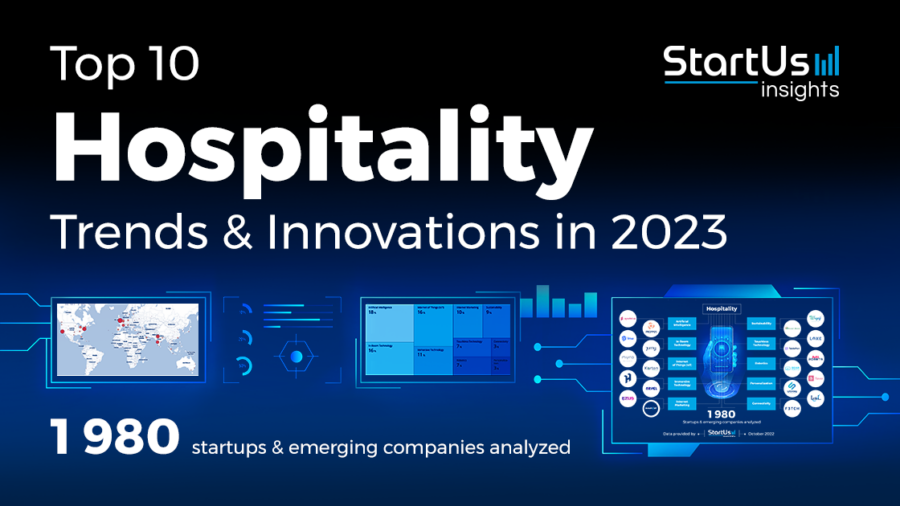
Share this:
- Click to share on Facebook (Opens in new window)
- Click to share on Twitter (Opens in new window)
- Click to share on LinkedIn (Opens in new window)
Top 10 Hospitality Trends & Innovations in 2023
Are you curious about which trends & startups will soon impact your hospitality business? Explore our in-depth industry research on 1 980 Hospitality startups & scaleups and get data-driven insights into technology-based solutions in our Hospitality Innovation Map!
The hospitality industry was massively hit during the COVID pandemic. Today, as travel resumes and countries across the world remove travel restrictions, the tourist inflow is more than ever. This forces hotel and property owners to automate manual tasks via advanced technologies such as AI, robotics, contactless technologies, and IoT devices, to save time and money. In addition, tourists expect a better guest experience which leads to the adoption of voice technology, chatbots, immersive technology, and other in-room technologies. This data-driven report examines the top hospitality trends and innovations impacting companies in 2023.
Innovation Map outlines the Top 10 Hospitality Trends & 20 Promising Startups
For this in-depth research on the Top 10 Hospitality Trends & Startups, we analyzed a sample of 1 980 global startups and scaleups. The result of this research is data-driven innovation intelligence that improves strategic decision-making by giving you an overview of emerging technologies & startups in the travel, tourism, and hospitality industries. These insights are derived by working with our Big Data & Artificial Intelligence-powered StartUs Insights Discovery Platform , covering 2 500 000+ startups & scaleups globally. As the world’s largest resource for data on emerging companies, the SaaS platform enables you to identify relevant startups, emerging technologies & future industry trends quickly & exhaustively.
In the Innovation Map below, you get an overview of the Top 10 Hospitality Trends & Innovations that impact companies worldwide. Moreover, the Hospitality Innovation Map reveals 20 hand-picked startups, all working on emerging technologies that advance their field.
Top 10 Hospitality Trends & Innovation
- Artificial Intelligence
- In-Room Technology
Internet of Things
- Immersive Technology
- Internet Marketing
- Touchless Technology
- Personalization
- Connectivity
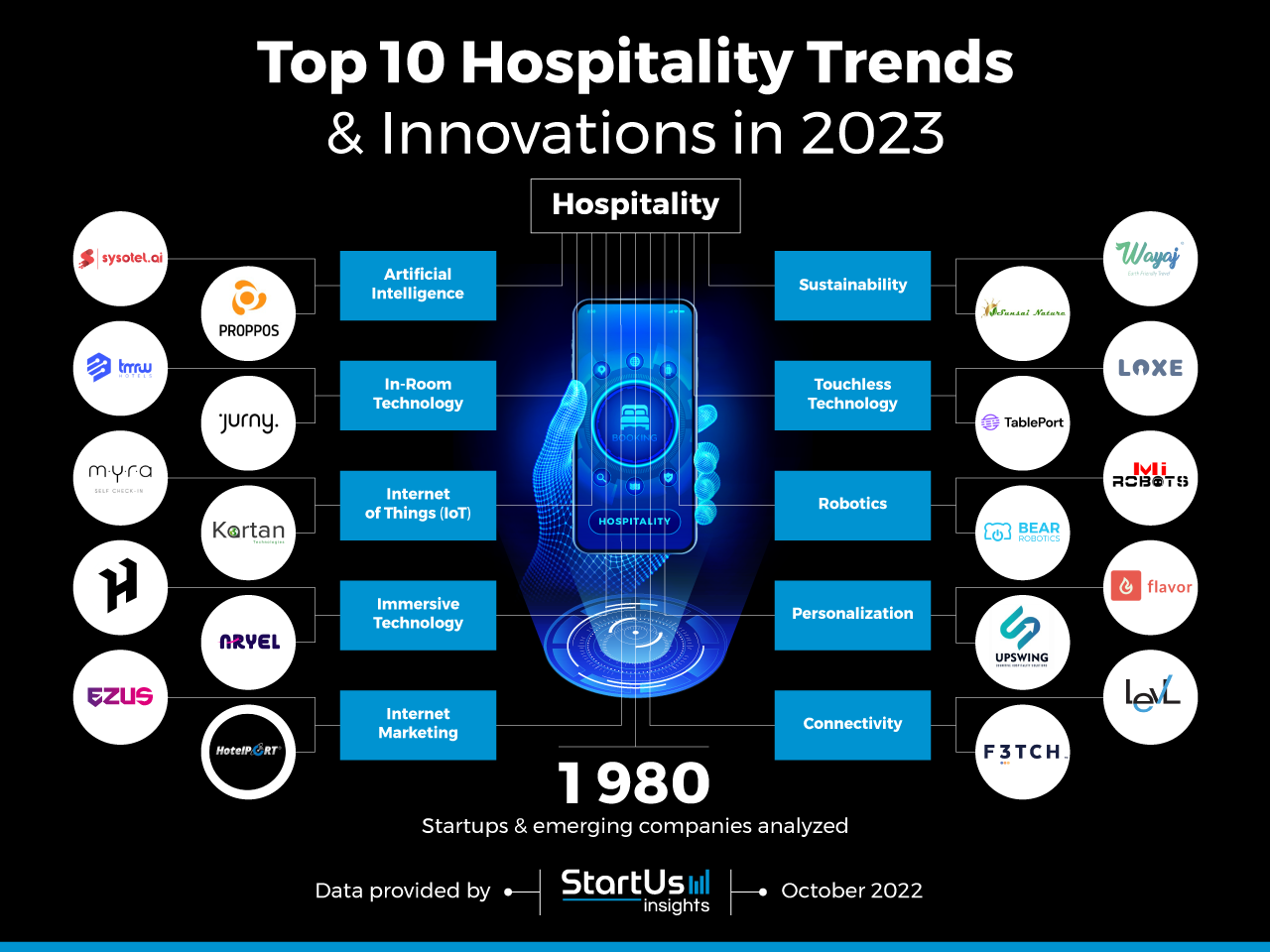
Click to download
Tree Map reveals the Impact of the Top 10 Hospitality Trends
Based on the Hospitality Innovation Map, the tree map below illustrates the impact of the Top 10 Hospitality Trends. Startups and scaleups are developing solutions to bring digitalization and automation to the hospitality industry. This is why artificial intelligence and in-room technologies such as keyless doors, online ordering, and integrated guest applications are the top trends in the industry. The competitiveness in the industry makes organizations adopt IoT & connectivity, immersive technologies, robotics, personalization, and internet marketing to achieve maximum guest satisfaction and attract more customers. Additionally, increasing consumer awareness encourages hotels and restaurants to adopt sustainable practices to reduce their carbon emissions.
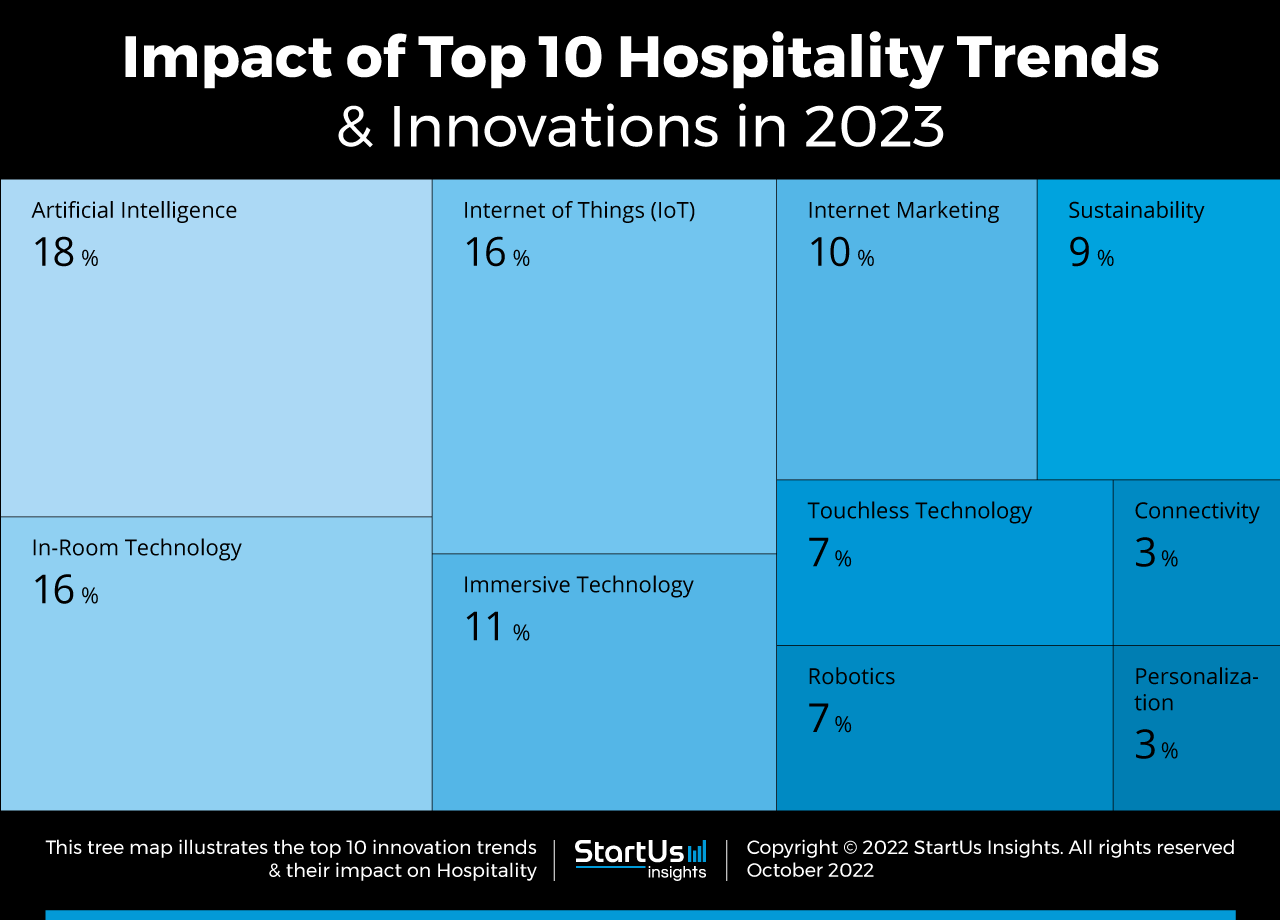
Schedule Demo
Global Startup Heat Map covers 1 980 Hospitality Startups & Scaleups
The Global Startup Heat Map below highlights the global distribution of the 1 980 exemplary startups & scaleups that we analyzed for this research. Created through the StartUs Insights Discovery Platform, the Heat Map reveals high startup activity in the US, UK, and India.
Below, you get to meet 20 out of these 1 980 promising startups & scaleups as well as the solutions they develop. These 20 startups are hand-picked based on criteria such as founding year, location, funding raised, and more. Depending on your specific needs, your top picks might look entirely different.
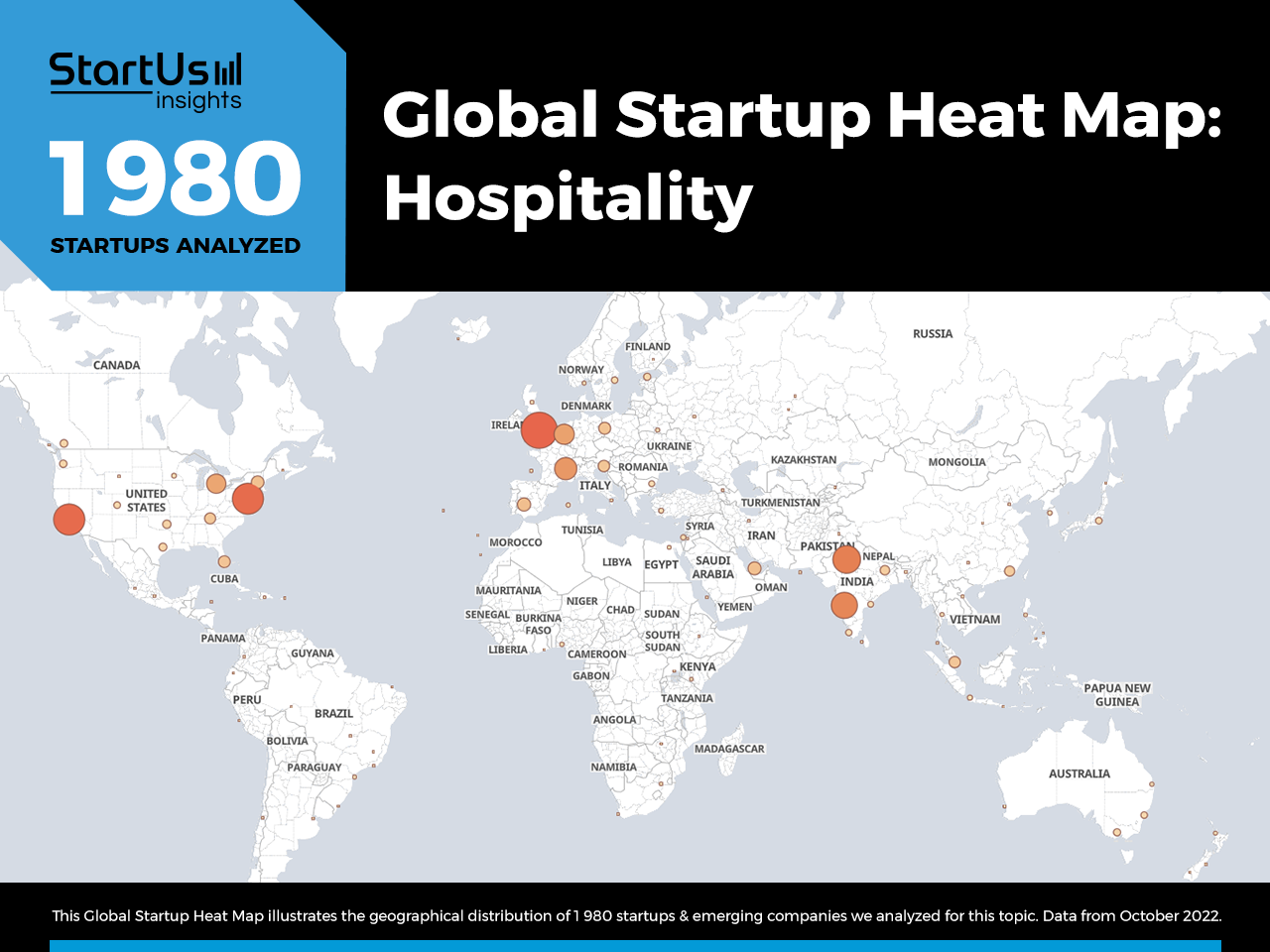
Top 10 Hospitality Trends & Innovation in 2023
1. artificial intelligence.
The ability of artificial intelligence to do traditionally human tasks at any time of day means that it is becoming more and more significant in the management of the hotel industry. This would imply that hotel owners can save a lot of money, get rid of human mistakes, and provide better service. Through the implementation of AI, a lot of tasks can be automated, such as price forecasting and predictions through historical data to improve hospitality services.
Sysotel automates Revenue Management
Sysotel is an Indian startup that develops an automated revenue management platform, SYSIRMS , for the hospitality sector. SYSIRMS uses artificial intelligence along with human inputs to automate the process of market research, demand forecasting, and pricing analysis. The system further extracts hotel data to give insights into inventory and customer management. The startup also offers SYSCM for managing the bookings through various online listings. Its solutions allow hotels to automate their processes and have competitive prices to increase their revenue.
Proppos builds a Food Items Recognition Solution
Proppos is a Spanish startup that offers FastPay, a self-checkout solution for restaurants. The solution is a plug-and-play installation that uses computer vision and artificial intelligence to automatically recognize food items and generate the bill accordingly. The startup’s food recognition platform is customizable and allows clients to train and deploy models for various checkout needs. In addition, the solution minimizes the customer wait timing and queues at billing counters of restaurants, airports, and train stations, resulting in higher productivity and customer satisfaction.
2. In-Room Technology
The air conditioning and the temperature are the two areas of smart technology that are most frequently encountered in hotel rooms. Customers can now remotely control their rooms thanks to the recent launches of digital devices and apps by big companies like Hilton Hotels.
Tmrw Hotels offers Digital Guest Systems
Tmrw Hotels is a Hungarian startup that builds advanced digital guest systems to enhance guest satisfaction throughout its customer journey. The startup’s phone application digitalizes and automates the processes of bookings, check-in, check-out, upselling, and payments. The application works as a digital key hence eliminating the need for a physical key or keycard. In addition, it offers an integrated payment platform for self-checkout and electronic invoices. The startup enables hotels, hostels, and Airbnbs to save costs while increasing efficiency and reducing their carbon footprint.
Jurny provides Application for Device Control
Jurny is a US-based startup that offers Software-as-a-service-based management solutions for hospitality businesses. The startup’s Access Control System makes it possible to control several devices through one application. The user can integrate and remotely control devices such as a smart thermostat, cameras, co2 & noise sensors. Further, the startup also offers solutions for AI-based pricing, automatic guest screening, and reputation tracking. The startup’s solutions allow hospitality management companies to save time and enhance their overall guest experience.
3. Internet of Things
IoT-connected gadgets are used to improve the visitor experience and the hotel management system for workers and administrators in a smart hotel. The hospitality sector has good potential to improve smart hotel rooms with automation systems. The convenience and comfort of the guests are boosted, and the efficiency, cost savings, and contentment of the guests benefit hotel owners and operators.
MYRA builds a Self Check-in Kiosk
MYRA is a Spanish startup that develops a self-check-in and check-out kiosk for hotels. The Myra STAND is a self-check-in kiosk that comes with a 15.6-inch touchscreen display, an inbuilt ID scanner, a keycard dispenser, a high-resolution camera with an active infrared, and an integrated payment solution. The kiosk comes with an integrated firewall and uses encryption for secure communication and data protection. The kiosk is fully customizable as per the hotel’s requirements. The startup also offers other self-service solutions such as Myra COMPACT , Myra Zip , Myra ONLINE , and Myra BOLT . The technology allows hotels to speed up the guest arrival process and increase operational efficiency.
Kartan Technologies provides IoT-based Employee Monitoring
Kartan Technologies is an Indian startup that develops IoT solutions for the hospitality industry. The startup’s end-to-end mobile application and web solution enable IoT-based employee monitoring. Each employee is given a digital ID card which allows them to mark smart attendance, and auto-update entry and exit times. The employers are able to track the geo-locations of the staff and assign tasks accordingly. The solution further ensures that no guest is left unattended and gets service on time.
4. Immersive Technology
According to a recent survey, the increasing use of immersive technologies like augmented and virtual reality will push consumer-facing companies, like those in retail, consumer goods, and travel, to increase investment in new capabilities and experiences to blend physical and virtual worlds. If they don’t, they risk falling behind.
Hotelverse offers a Hotel Immersive Experience
Hotelverse is a Spanish startup that develops an API platform for an immersive experience of the hotel. The startup has built innovative UX processes that allow property owners to showcase a 3D digital twin of their hotel to the customers while booking their stay. Its API platform integrates with any booking engine or property management system. Hotelverse enables guests to have a virtual tour of a room, restaurants, spa, garden, and other amenities of the hotel. As a result, hotels are able to up their sales and eliminate the middleman for bookings.
Aryel offers SAAS Marketing Platform
Aryel is an Italian startup that offers a Software-as-a-service marketing platform to make marketing campaigns engaging with augmented reality (AR). The custom webAR allows travel agencies and hotels to create AR content through drag and drop feature without having to code. The software comes with ready-to-use photos, graphics, and 3D models. The hospitality industry’s AR advertising engages potential customers from across the globe without having to worry about language barriers.
5. Internet Marketing
Social media is crucial for marketing in the hospitality sector. To attract visitors, employ eye-catching graphics, informative content, and good testimonials. If you back these up with a positive customer experience, you’ll see that your fan base is continually expanding.
Ezus builds a Travel Software
Ezus is a French startup that builds travel software to simplify tour planning for travel companies. The software allows travel agencies to manage their website and construct their itineraries. The tool comes with an integrated CRM system, invoicing system, map itinerary, and project pipeline. Travel agencies are able to customize their own budget builders and manage suppliers through a single tool. The startup allows travel planners to attract more customers and efficiently sell custom trips.
HotelPort Monitors Content Accuracy
HotelPORT is a US-based startup that offers content accuracy monitoring through its propertyVIEW solution. PorpertyVIEW combines human intelligence along with AI and machine learning technologies to audit the content on hotel and third-party websites. The solution checks the accuracy of all descriptions, pictures, and amenities and generates an accuracy score for hotels and restaurants to make improvements. The solution attracts potential guests via quality content and increases revenue.
6. Sustainability
There are numerous advantages to using sustainability in the hospitality industry. In addition to bringing in more clients and appropriately addressing what many see as a moral duty in light of the current climate catastrophe, sustainable initiatives provide incentives for hospitality firms.
Wayaj gives Hotel Sustainability Ratings
Wayaj is a US-based startup that offers sustainability solutions for the hospitality sector to know and reduce their carbon footprint. The startup develops a B2C booking platform, Alight that lists sustainable accommodations. The platform allows responsible travelers to make reservations at sustainable hotels and resorts and gain carbon offsets during their checkout. It also develops a hotel sustainability rating (HSR) that gives eco scores to a hotel based on 7 sustainable practices. Further, the startup’s proprietary software, IMPPACT consists of a carbon footprint calculating engine (CFC Engine) and possible sustainable actions for neutralizing the carbon footprint.
Sunsai Nature provides Eco-friendly Products
Sunsai Nature is a German startup that offers eco-friendly products to restaurants and hotels as an alternative to replacing single-use plastic products. Its product range includes paper straws made of recycled paper, compostable takeaway boxes, as well as biodegradable spoons, knives, and folks. Other than cutlery items, the startup also sells bamboo toothbrushes, bamboo combs, reusable laundry bags, and biodegradable vanity sets. The startup’s products allow hotels and restaurants to reduce their plastic waste production significantly.
7. Touchless Technology
A touchless check-in and check-out process is one of the top concerns for guests trying to avoid the busy front desks. Hotels must make investments in more flexible booking strategies through specialized booking engines or online distribution channels as more customers make their bookings online. With a remote digital concierge system that is intended to smoothly handle end-to-end operations contact-free, Hotelogix led this fundamental transition on a global scale. We have prioritized safety for both guests and workers with contactless choices for check-in/out and touchless services for reservations without affecting the integrity of the system, which is connected centrally through the cloud.
Loxe converts Smartphone to Hotel key
Loxe is a US-based startup that develops end-to-end solutions for mobile keys. With the startup’s mobile application guests unlock their doors through their phones, eliminating the need for a physical key or a keycard. In addition, the startup’s mobile app also allows guests to access other room services with just a few clicks. Further, the startup upgrades the existing locks of the hotels to mobile-ready door locks, by connecting a Bluetooth module to keycard door locks. The solution offers guests greater convenience while opening new revenue streams for hotels.
TablePort builds Contactless Order & Payment Solution
TablePort is an Israeli startup that develops a solution for contactless ordering and payments at restaurants and hotels. Once the customers scan a hotel’s QR code through their mobile device, they are able to place their order from an intuitive and personalized menu. As soon as the order is placed and completed payment is made automatically. The digital solution reduces the wait time for customers and makes ordering as well as bill settlements fast and efficient.
8. Robotics
Modern robots can be either autonomous or semi-autonomous and may make use of artificial intelligence (AI) and speech recognition technology. With that being said, most robots are programmed to perform specific tasks with great precision, with an example being the industrial robots seen in factories or production lines. The use of artificial intelligence within the field of robotics is one of the most exciting and promising applications for individuals and businesses operating within hospitality management.
MiRobots develops Customizable Robots
MiRobots is an Indian startup that provides robots for the hospitality industry. The startup programs the robots with artificial intelligence algorithms and customizes them according to the specific task. For instance, humanoid robots work as check-in robots at hotels to automate the task and disinfection robots for cleaning and sanitizing spaces so that humans are not exposed to germs. Similarly, the delivery robots ensure contactless food deliveries in restaurants. The startup allows the hospitality industry to automate a lot of operational tasks with the help of robots.
Bear Robotics builds Restaurant Service Robots
Bear Robotics is a US-based startup that builds serving robots for hospitality management. Autonomous mobile robots (AMRs) are useful for taking orders to the tables or clearing empty dishes from the tables. The robots are a combination of agile movement with a versatile design and come in two models; Servi and Servi Mini . The robots are capable of serving heavy drink orders, multiple food trays, and bussing tables with a bussing tub. This allows the staff to focus on customer experience and satisfaction.
9. Personalization
The purpose of personalization is to improve the customers’ experiences and answer their needs more effectively and in a shorter time. This way interactions between the company and the buyers are easier and the satisfaction of the latter is increased. It is tailoring our offer to our individual customers.
Flavor enables Personalized Food Ordering
Flavor is a US-based startup that develops a food ordering application with a personalized layout for each user. The application, with the help of user history and predictive analytics, personalizes the menu of each food outlet by hiding the dishes that the user does not like. Further, the application also notifies the user if a dish they like from a menu has a new ingredient that they don’t like. The food app helps restaurants grow their sales by making food ordering easier and adding a 5-second video of each dish.
Upswing provides a Guest Intelligence Platform
Upswing is an Indian startup that offers data-driven cognitive solutions for the hospitality industry. The startup’s guest intelligence dashboard solution, AURA , is powered by guest data, artificial intelligence, and machine learning. The platform is partially hosted on a private or consortium blockchain. AURA uses data from multiple sources to give a full insight into the guest’s likes, dislikes, preferences, and purchase patterns. The solution allows hotels to create a personalized experience for each guest and serve them in the best possible way.
10. Connectivity
The Internet of Things, room automation, artificial intelligence, and virtual assistants such as Amazon’s Alexa are making headway in the hotels and hospitality sector, but none of this is possible without the right foundation of secure connectivity. No matter how luxurious your hotel, how sumptuous the food, or how relaxing the spa is, if you don’t offer secure connectivity and mobile guest services, you are unlikely to fill your rooms.
LEVL offers Device Intelligence
LEVL is a US-based startup that offers a full-stack device intelligence solution for hotels. LEVL’s patented solution assigns a unique identifier ( LEVL-ID ) to every individual device on the network. It identifies and verifies all devices accessing the network with a passive out-of-band approach. In addition, it helps recognize what type of devices are using the network along with their activity analysis. It is a simple plug-in solution that allows hotels to enhance their wifi network services without compromising users’ data privacy.
F3TCH converts Smartphones into Hotel Telephone
F3TCH is a US-based startup that develops a patented mobile application for hotel guests. The application allows guests to connect their hotel telephones to their smartphones and advances communication and service delivery. F3TCH converts smartphones into a hotel intercom and allows guests to order services via voice calls, or text messages. The startup enables hotels to update their communication style and improve the guest experience.
Discover all Hospitality Trends, Technologies & Startups
The top 10 trends of the hospitality industry bring about innovative changes in the hotels and restaurants that attract more customers as well as enhance customer satisfaction. Soon, the hospitality industry will be free of manual servers as robotics will find more applications. Further, the metaverse and immersive technologies make the entire travel experience more interactive and enthusiastic for guests. Finally, renewable energy, recyclable materials, vegan food, and waste management solutions will continue to make the hospitality sector more and more sustainable by reducing emissions.
The Hospitality Trends & Startups outlined in this report only scratch the surface of trends that we identified during our data-driven innovation and startup scouting process. Among others, elevated customer experiences, process automation, and smart sensor technology look set to transform the sector as we know it today. Identifying new opportunities and emerging technologies to implement into your business goes a long way in gaining a competitive advantage. Get in touch to easily and exhaustively scout startups, technologies & trends that matter to you!
Discover our Free Waste Management Report
Your Name Business Email Company
Get our free newsletter on technology and startups.
Protected by reCAPTCHA and the Google Privacy Policy and Terms of Service apply.
Get in touch!

Mobility 22 pages report
First & Last Name Business Email Company
Industry 4.0 22 pages report
Leverage our unparalleled data advantage to quickly and easily find hidden gems among 4.7M+ startups, scaleups. Access the world's most comprehensive innovation intelligence and stay ahead with AI-powered precision.
Get in touch
Your Name Business Email Company How can we support you? (optional)
Business Email

Protected by reCAPTCHA and the Google Privacy Policy and Terms of Service apply.
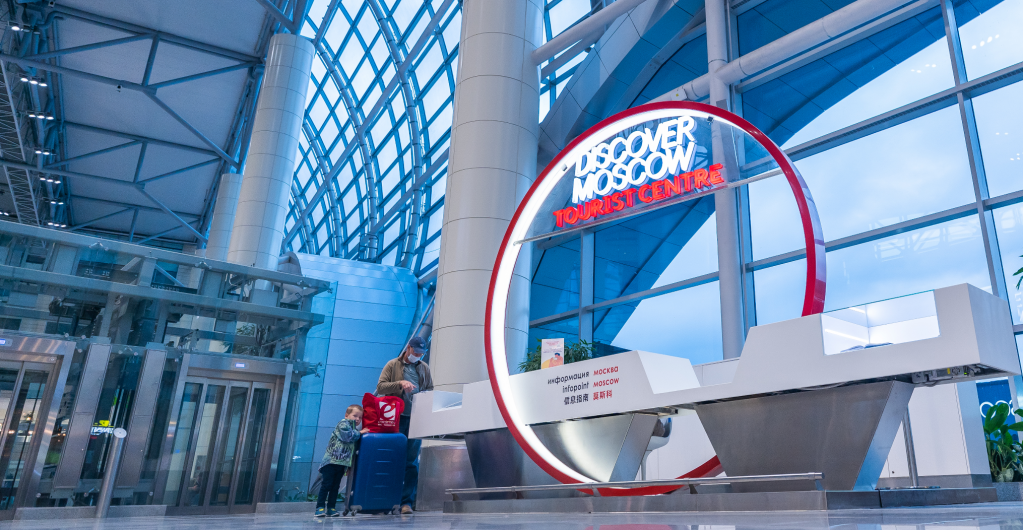
ABOUT US more
Projects more.
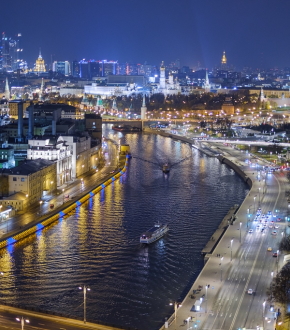
Digital travel service RUSSPASS
An innovative travel planning service.
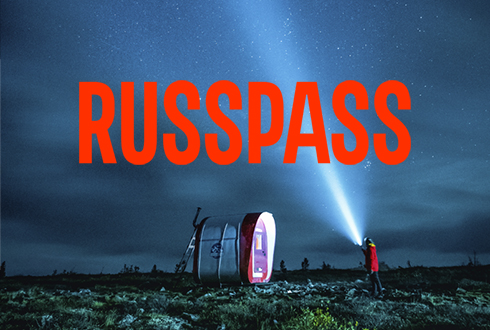
Moscow City Tourism Committee concludes its first-ever digital roadshow in India to a resounding success
The 4-day panned virtual event was specially curated to present the “City of Moscow” as an attractive travel destination to the vibrant Indian outbound travel fraternity spread across 15 major cities PAN India.

Moscow tops the main category at World Travel Awards
Moscow wins in two categories of world travel awards europe, dear moskvichi: 10 stories about moscow told by its citizens.
The main component of each city is its residents. Moscow City Tourism Committee is launching Moskvichi, a special project that aims at showcasing the city through its residents' stories.
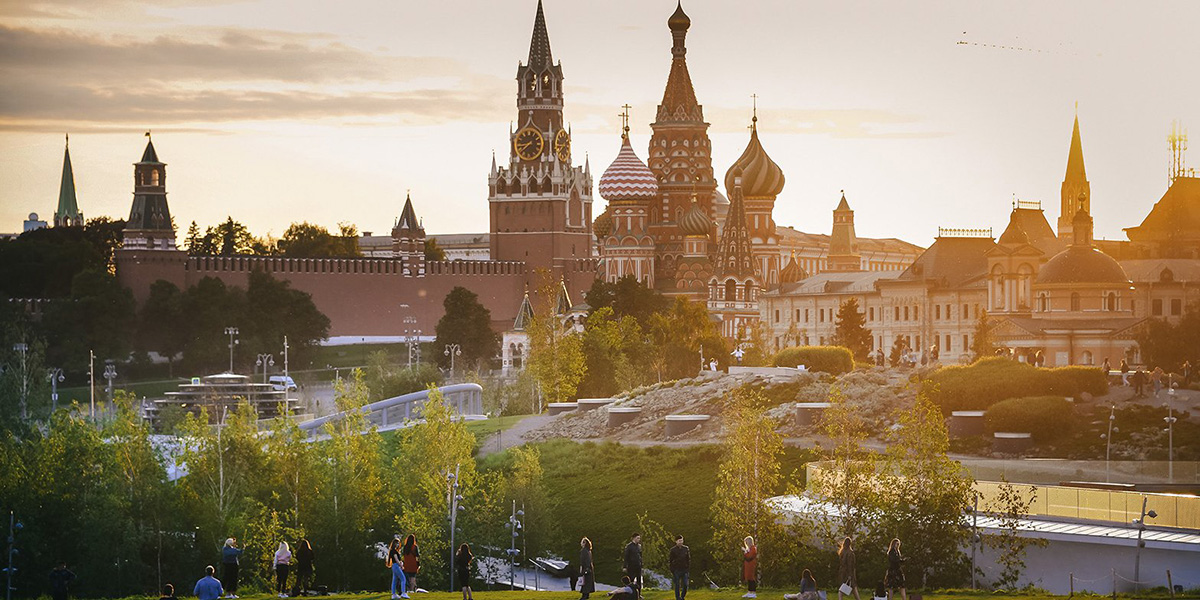
Sergey Sobyanin proposed voting for Moscow at the World Travel Awards
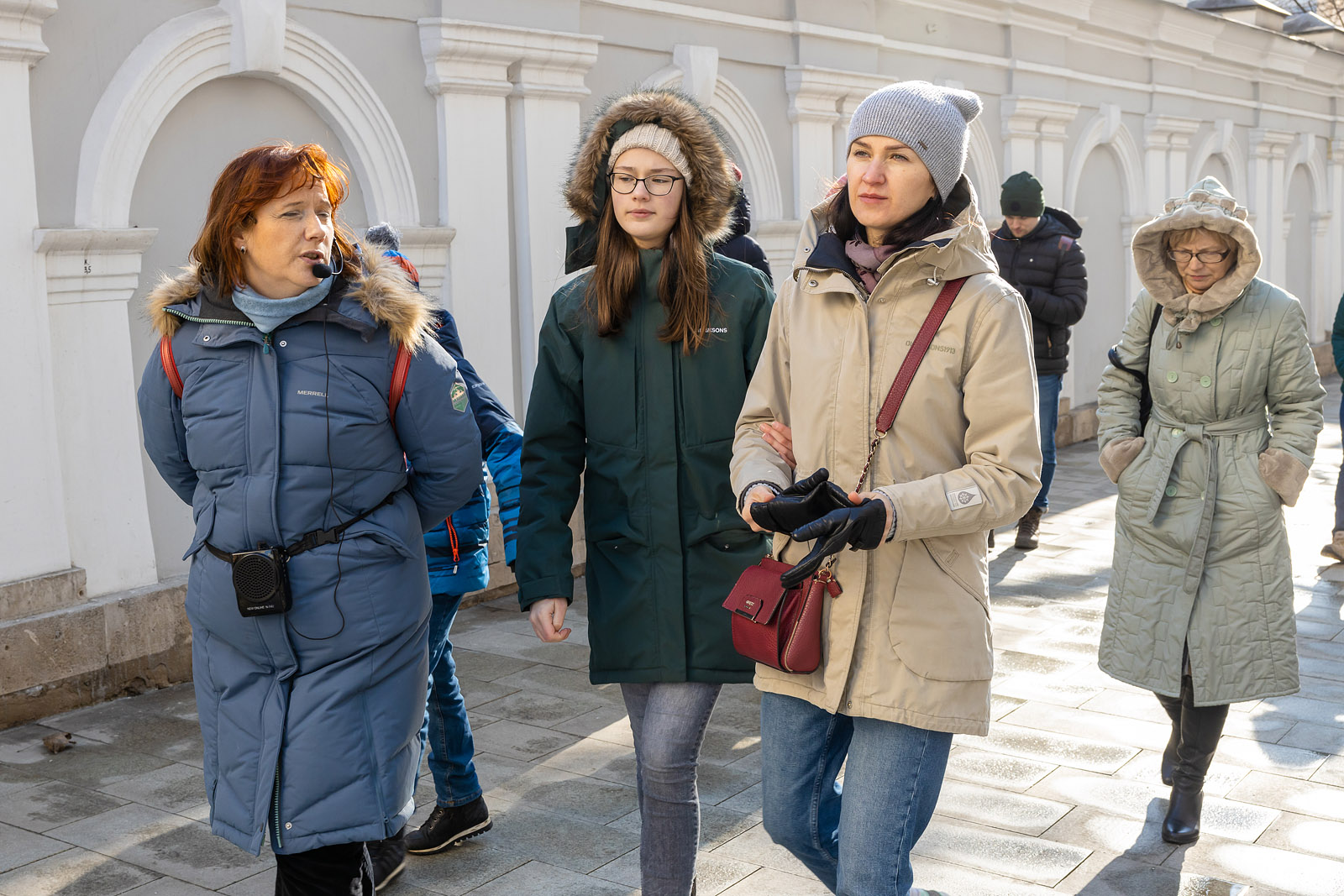
Natalya Sergunina: City tours in honour of International Tourist Guide Day attracted over 3,500 visitors
Natalya sergunina: five moscow hotels were included in the annual forbes travel guide star award ranking.
For the first time, the Four Seasons Hotel Moscow, opened in 2014, was awarded the highest 5-star rating. In addition, the 4-star rating was awarded to Lotte Hotel, The Ritz-Carlton, and Ararat Park Hyatt in Moscow. The “Recommended” rating was awarded to The St. Regis Nikolskaya Hotel in Moscow.

#valentines: romantic photography locations in Moscow
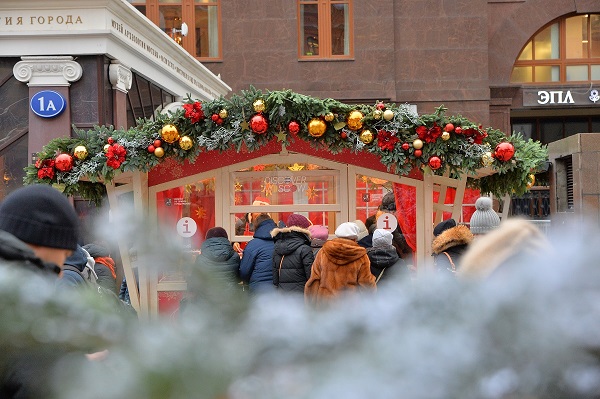
Over 15 Thousand People Visit Tourist Information Centre During Journey to Christmas Festival
Moscow restaurant listed in the russian book of records.
Birds, a restaurant with a panoramic view of Moscow, has set a record and become officially the highest restaurant and club in Europe. This fact has been registered in the Russian Book of Records. The restaurant is located in Moscow-City (MIBC).
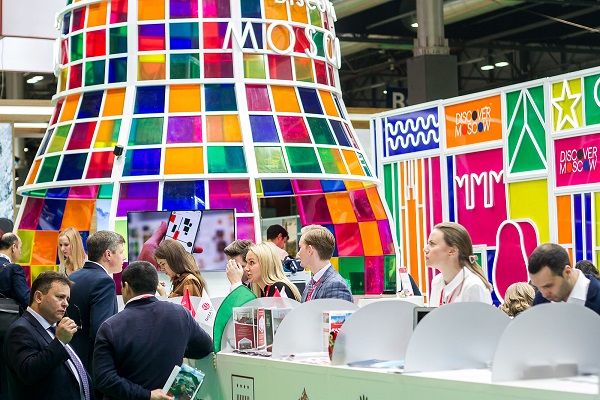
Business meetings, VR travels, and the iconic Moscow ice cream: FITUR tourism trade fair recap
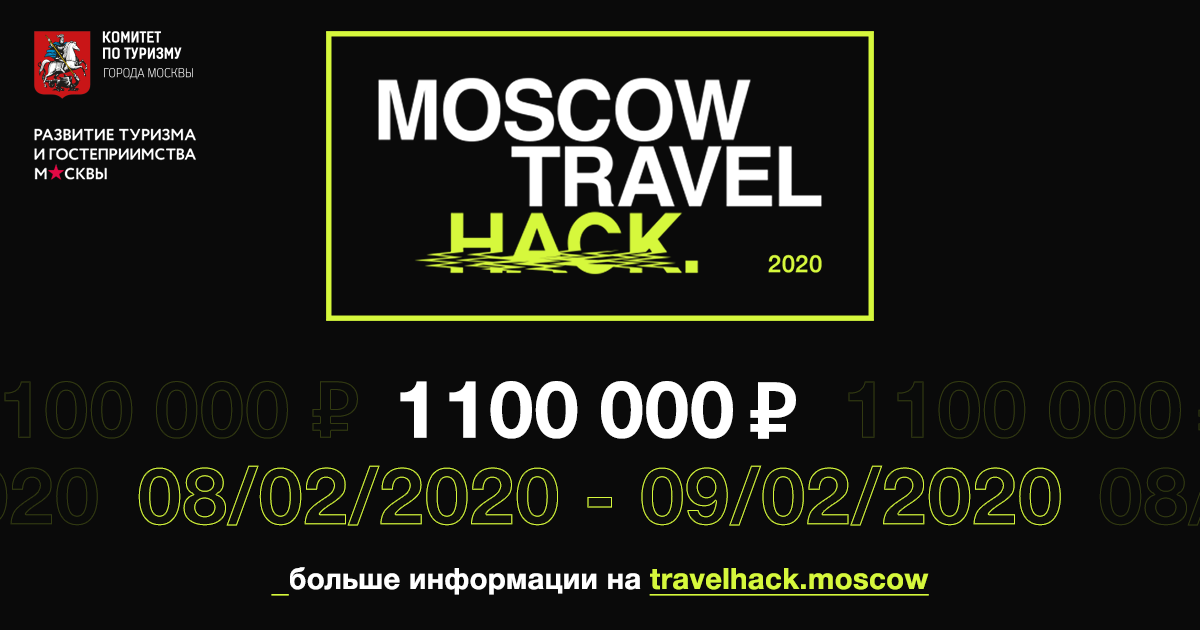
More than 500 people have applied to participate in the Moscow Travel Hack
Moscow to take part in major international tourism trade fair in madrid.
FITUR Madrid 2020 will be the first international event this year where Moscow will present its tourism potential. It will be held from 22 to 26 January.


Mission Moscow : A Conversation with Evgeny Kozlov
Mr. Evgeny Kozlov, Deputy Head Mayor of Moscow Government and Chairman of the Moscow City Tourism Committee, who has come to the city to attain BLTM, the annual prestigious travel event at the Leela Ambience Convention Centre, Delhi spoke with TW Editor Anirban Dasgupta on his vision and goal with the all-new tourism initiatives in Moscow.
The bond between India and Russia has a long history of culture, literature, love, and of course politics. But recently, there has also been a lot of talk about Gastronomical tourism. Any personal experience with this?
My personal take on the bond between India and Russia stems from my recent experience of trying authentic Indian cuisine in Moscow. I thoroughly enjoyed the spicy flavours of the Curry dish I tried and it left a lasting impression on me. This made me appreciate the cultural exchange between our two countries even more. I believe that Moscow, being a culinary hub, is a great place for people from all over the world, including Indian visitors, to immerse themselves in our rich history and culture. It’s a unique experience that brings people together and showcases the diversity of the gastronomic universe. Moscow has a thriving food scene with various international cuisines to explore, from Chinese to South African and Latin American. This culinary diversity reflects the open-mindedness and curiosity of the Russian people when it comes to trying new types of food. Moscow truly has something for everyone, and I encourage Indian tourists to come and indulge in this gastronomic journey.

How optimistic are the post-pandemic recovery figures?
After the Covid-19 pandemic, we have witnessed a remarkable recovery in tourism in Moscow. In fact, we have been able to restore 90% of the pre-pandemic tourist flow. In the first half of 2023, almost a million foreign tourists visited Moscow, with over 600,000 of them arriving during the summer season. Among the non-CIS countries, China has led the way in terms of tourist traffic, followed by Iran, the United Arab Emirates, Turkey, and India. Prior to the pandemic, India’s tourist flow was steadily growing at a rate of 12-15% annually. Although we faced challenges during the pandemic, we have now put in place all the necessary conditions for a successful recovery. Moscow is known for hosting numerous international exhibitions, forums, congresses, and conferences, attracting approximately 3.6 million business visitors in the past year alone. Among these visitors, India ranks third in terms of foreign business tourists in Moscow. To further promote tourism, we have initiated the MICE Ambassadors training program in India, which aims to assist Indian businesses in exploring opportunities and selecting relevant events in Moscow.
Can you please share your vision for future tourism development in Moscow?
Thank you for asking this question. I have a multi-faceted vision for the future tourism development in Moscow.
Firstly, I believe that tourism should provide a personal and authentic experience for each individual. Therefore, customization of experiences is crucial. For business tourists, we aim to offer special infrastructure facilities that cater to their specific needs and requirements. We are closely collaborating with infrastructure providers to ensure seamless experiences for those visiting Moscow for business purposes. On the other hand, when it comes to leisure or family tourists, we recognize the importance of providing a support system and guidelines for those traveling with their families, especially children. We are working with museums, theatres, and restaurants to customize their services and products to cater to tourists of all ages, including children. Furthermore, I envision rearranging tourism in Moscow to encourage visitors to delve into the history and heritage of our country. A significant part of my tourism goal is to motivate and inspire the youth and younger generations to travel to Russia. This involves providing affordable pricing for accommodations, entertainment, museums, and other attractions.
We are already constructing tailor-made infrastructure that specifically targets the young generation in Russia, and by next year, we plan to extend and promote these offerings to international young visitors as well. By rebranding the image of Moscow as a destination for longer stays, relaxation, and enjoying various facilities, we aim to change the perception that it is merely a transit or stop-over city. Lastly, the beautiful weather in Moscow during the summer months provides an opportunity to create delightful memories for tourists. I want every visitor to experience the sunshine, green landscapes, parks, cafes, restaurants, swimming pools, and sports facilities that Moscow has to offer during this time.
In summary, my vision for the future of tourism in Moscow revolves around creating customized travel experiences for every type of traveller.
How do you prioritize sustainability and responsible tourism practices in the development of business tourism?

How easy or difficult is it to get a Visa for an Indian Tourist at present?
Acquiring a Visa for Indian tourists has become easier with the introduction of the e-visa system. Since its launch in August 2023, more than 30,000 tourists have already utilized this system. The e-visa offers several advantages over traditional visas, such as avoiding the need to visit consulates or embassies. The application process only requires a digital photograph and a scan of the passport data page. The e-visa has a validity period of 60 days from the date of issuance, with a maximum stay of 16 days in Russia. This convenient and streamlined process is available to citizens of 55 countries, including India. Indian tourists are currently ranked third in terms of business travellers from outside the CIS countries visiting Moscow.
Author: Anirban
Share article, related news.

BLTM 2023 showcases top destinations for Bleisure and MICE Travel

École Ducasse Abu Dhabi Studio, in partnership with Erth Hospitality, to open this December
No comment be the first one., leave a reply cancel reply.
Your email address will not be published. Required fields are marked *
Save my name, email, and website in this browser for the next time I comment.

IMAGES
VIDEO
COMMENTS
Abstract. This chapter explores how marketers design and manage tourism and hospitality products. It begins with definitions for the terms "product", "offering", and "product mix". It the chapter explains that the product is a complex concept that should be considered on three levels. These are the core, expected, and augmented product.
In this form of product diversification the primary tourism products in a destination are largely based on a number of niche market, small-scale products. On the one hand, the destination's niche products may develop separately and in parallel, with discrete tourist market segments being attracted, and with the producers of the different niche ...
Product Development. As defined by UN Tourism, a Tourism Product is "a combination of tangible and intangible elements, such as natural, cultural and man-made resources, attractions, facilities, services and activities around a specific center of interest which represents the core of the destination marketing mix and creates an overall visitor experience including emotional aspects for the ...
The hospitality and tourism industry is a bustling world, filled with endless opportunities for adventure, relaxation, and exploration. It's one of the fastest-growing industries globally, driving economies and creating millions of jobs. Whether it's the charm of a local bed and breakfast, the splurge at a luxurious resort, the thrill of a ...
For academics, this special issue serves as starting point to push the boundaries and to encourage looking at the current global environment through difference lenses. For example, medical tourism and medical hotels are not the same products. The latter suggests a very different type of service and a convergence of health care and hospitality.
Tourism and Hospitality Products, Branding, and Pricing. May 2021. DOI: 10.1007/978-3-030-64111-5_8. In book: Marketing Tourism and Hospitality (pp.249-283) Authors: Richard George. To read the ...
Established in 1976, the Journal of Hospitality & Tourism Research (JHTR) plays a major role in incubating, influencing, and inspiring hospitality and tourism research.JHTR publishes original research that clearly advances theoretical development and offers practical value for hospitality and tourism ecosystems.JHTR strives to publish research with IMPACT...
Tourism and Hospitality is an international peer-reviewed open access quarterly journal published by MDPI. Please visit the Instructions for Authors page before submitting a manuscript. The Article Processing Charge (APC) for publication in this open access journal is 1200 CHF (Swiss Francs). Submitted papers should be well formatted and use ...
As summarized by Ixta Belfrage, a U.K.-based cookbook author "Plant forward is the way forward" and she recommends making "plants the star of the dish to eat less animal products". The democratization of vegan food underlines the sustainability turn undertaken by the hospitality and tourism industry.
It defines tourism as follows: Tourism is a social, cultural and economic phenomenon which entails the movement of people to countries or places outside their usual environment for personal or business/professional purposes. These people are called visitors (which may be either tourists or excursionists; residents or non-residents) and tourism ...
This data-driven report examines the top hospitality trends and innovations impacting companies in 2023. Innovation Map outlines the Top 10 Hospitality Trends & 20 Promising Startups. For this in-depth research on the Top 10 Hospitality Trends & Startups, we analyzed a sample of 1 980 global startups and scaleups.
Perishability plays the most significant characteristic in the tourism industry. The product or services in the tourism and travel industry are been availed as they are produced. Usually, the service can't be stored as they are highly perishable. When the room in the hotel is not reserved tonight, you can't take 'tonight' and sell it ...
Virtual reality continues to permeate the tourism sector. Bigne and Maturana (2022) examined the potential of virtual reality as a shopping tool, noting that this technology has not yet been adequately investigated as an avenue for marketing tourism-related products and services. The authors proposed a model and compared visit intention and ...
Tourism and Hospitality, an international, peer-reviewed Open Access journal. Next Volume Volume 3 (2022) Previous Volume Volume 1 (2020) ... Please let us know what you think of our products and services. Give Feedback Information. Visit our dedicated information section to learn more about MDPI. Get Information
Consumer Behavior in Tourism and Hospitality is an international, double-blind peer reviewed journal, that fosters multidisciplinary and interdisciplinary research in consumer behavior in tourism and hospitality. Previously published as International Journal of Culture, Tourism, and Hospitality Research (ISSN: 1750-6182).
They reassessed their products and gained new experience. In this connection, Moscow's Committee for Tourism suggested a number of projects to market players. In February 2020, Moscow was the venue of the first large-scale national hackathon Moscow Travel Hack on digitalising the tourist and hospitality industry.
Tourism and hospitality product. Aug 2, 2013 •. 14 likes • 37,655 views. Kosala Wimukthi. Tourism and hospitality product. Education Business Design. Download now. Download to read offline. Tourism and hospitality product - Download as a PDF or view online for free.
Moscow supports the tourism and hospitality industry too, and a key industry initiative was the launch of the Moscow Travel Hub online platform last spring. The main aim of the Hub is to provide ...
ABOUT US more. We realize image projects and carry out different marketing events for developing tourism potential of Moscow in Russia and abroad. ANO «Project Office for the Development of Tourism and Hospitality of Moscow» was established by the Committee on Tourism of the city of Moscow in November 2018.
A record-breaking year is projected for Travel and Tourism. TA'AKTANA, a Luxury Collection Resort & Spa, Labuan Bajo. Despite the plethora of daunting challenges faced by the hospitality ...
The hotel and tourism industries are on the cusp of a significant transformation. Reports by ICRA, investment information and credit rating agency, suggest that the hospitality industry in India ...
Mr. Evgeny Kozlov, Deputy Head Mayor of Moscow Government and Chairman of the Moscow City Tourism Committee, who has come to the city to attain BLTM, the annual prestigious travel event at the Leela Ambience Convention Centre, Delhi spoke with TW Editor Anirban Dasgupta on his vision and goal with the all-new tourism initiatives in Moscow. The bond between India and Russia has a long history ...